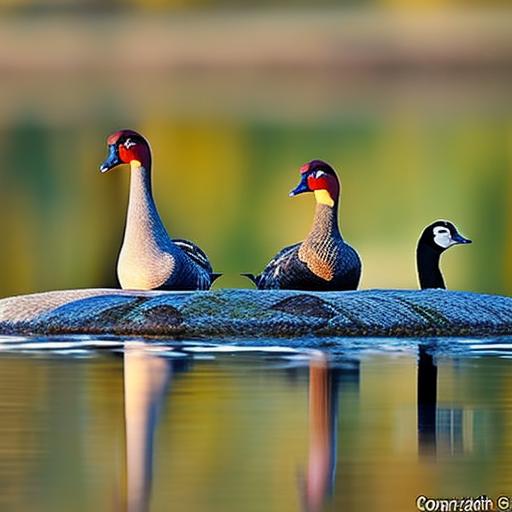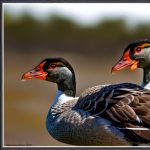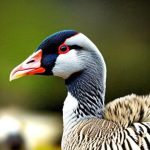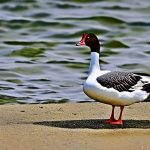Keeping geese and ducks together can be a rewarding and beneficial experience for poultry enthusiasts. Geese and ducks are both waterfowl species that share similar characteristics and needs, making it possible to house them together. By understanding their behavior, providing appropriate housing and nutrition, and addressing any challenges that may arise, you can successfully keep geese and ducks together.
There are several benefits to keeping geese and ducks together. Firstly, they can provide pest control for your property. Geese are known for their ability to graze on grass and weeds, while ducks are excellent at eating insects and snails. By allowing them to roam freely in your yard or garden, they can help keep unwanted pests under control.
Additionally, geese and ducks produce nutrient-rich fertilizer through their droppings. This can be used to fertilize your plants and improve soil quality. Their waste is high in nitrogen, phosphorus, and potassium, which are essential nutrients for plant growth. By keeping geese and ducks together, you can harness the benefits of their natural fertilizer production.
Furthermore, geese and ducks can provide entertainment value. Their playful antics and social interactions can be enjoyable to watch. They also have unique personalities and can form bonds with their human caretakers. Keeping geese and ducks together can add a lively and entertaining element to your backyard or farm.
Lastly, geese and ducks can provide companionship for each other. These social birds thrive in the company of others of their kind. By keeping them together, you are providing them with the opportunity to form social bonds and engage in natural behaviors. This can contribute to their overall well-being and happiness.
Key Takeaways
- Keeping geese and ducks together is possible and can have benefits.
- Understanding the behavior of geese and ducks is important for successful cohabitation.
- Benefits of keeping geese and ducks together include pest control and companionship.
- Challenges of keeping geese and ducks together include aggression and hygiene concerns.
- Housing requirements for geese and ducks should include separate areas for nesting and feeding.
Understanding the Behaviour of Geese and Ducks
Geese and ducks have some differences in behavior that should be taken into consideration when keeping them together. Geese are known for their honking vocalizations, which they use to communicate with each other. They are also highly territorial and can be protective of their flock. Ducks, on the other hand, are more social and tend to form larger groups. They have a wider range of vocalizations and are known for their quacking sounds.
When kept together, geese and ducks will interact with each other. They may engage in social grooming, where they preen each other’s feathers. They may also engage in play behaviors, such as splashing in water or chasing each other. It is important to provide ample space for them to engage in these natural behaviors.
Geese and ducks have a social hierarchy within their flock. Geese are known for their dominance behaviors, where they establish a pecking order. This hierarchy is typically based on age and size, with older and larger geese being more dominant. Ducks also have a social hierarchy, but it is generally less pronounced than that of geese. Understanding the social dynamics within your flock can help you manage any potential aggression or dominance issues that may arise.
Benefits of Keeping Geese and Ducks Together
One of the main benefits of keeping geese and ducks together is their ability to control pests. Geese are excellent grazers and can help keep grass and weeds under control. They will eat a variety of plants, including dandelions, clover, and grasses. Ducks, on the other hand, are great at eating insects and snails. They will happily consume pests such as slugs, mosquitoes, and flies. By allowing geese and ducks to roam freely in your yard or garden, you can reduce the need for chemical pesticides and promote a more natural pest control method.
Another benefit of keeping geese and ducks together is their fertilizer production. Geese and ducks produce nutrient-rich droppings that can be used as fertilizer for your plants. Their waste contains high levels of nitrogen, phosphorus, and potassium, which are essential nutrients for plant growth. By allowing geese and ducks to graze and roam in your garden, you can harness the benefits of their natural fertilizer production. This can help improve soil quality and promote healthy plant growth.
In addition to their practical benefits, geese and ducks can also provide entertainment value. Their playful antics and social interactions can be enjoyable to watch. Geese are known for their honking vocalizations and their protective nature, while ducks are known for their quacking sounds and their love of water. By keeping geese and ducks together, you can add a lively and entertaining element to your backyard or farm.
Lastly, geese and ducks can provide companionship for each other. These social birds thrive in the company of others of their kind. By keeping them together, you are providing them with the opportunity to form social bonds and engage in natural behaviors. This can contribute to their overall well-being and happiness.
Challenges of Keeping Geese and Ducks Together
While there are many benefits to keeping geese and ducks together, there are also some challenges that should be considered. One challenge is aggression and dominance issues. Geese are known for their territorial behavior and can be aggressive towards other birds, including ducks. They may chase or peck at ducks, especially if they feel threatened or if there is competition for resources such as food or nesting sites. It is important to monitor their behavior closely and intervene if necessary to prevent any harm to the ducks.
Another challenge is the different dietary needs of geese and ducks. Geese are primarily grazers and require a diet that is high in grasses and greens. They also need access to fresh water for drinking and bathing. Ducks, on the other hand, require a diet that is higher in protein and fat. They need access to insects, snails, and other small prey items, as well as a balanced commercial feed. It is important to provide a varied diet that meets the nutritional needs of both geese and ducks.
Housing requirements can also be a challenge when keeping geese and ducks together. Geese and ducks require different types of housing. Geese prefer open spaces with access to water, while ducks require sheltered areas with nesting boxes. It is important to provide adequate space and shelter for both species to ensure their comfort and well-being.
Health and hygiene considerations are also important when keeping geese and ducks together. Both species are susceptible to certain diseases and parasites, such as avian influenza and parasites like mites and lice. It is important to implement preventative measures, such as regular cleaning and disinfection of their housing, as well as providing proper nutrition and veterinary care.
Housing Requirements for Geese and Ducks
When keeping geese and ducks together, it is important to provide appropriate housing that meets the needs of both species. Geese prefer open spaces with access to water, while ducks require sheltered areas with nesting boxes.
The size of the housing will depend on the number of geese and ducks you have. As a general rule, each goose requires at least 10 square feet of space, while each duck requires at least 4 square feet of space. It is important to provide enough space for them to move around comfortably and engage in natural behaviors.
The type of housing will also depend on your specific needs and preferences. Geese can be housed in a simple shelter or a fenced-in area with access to water. Ducks, on the other hand, require a sheltered area with nesting boxes for egg-laying. This can be a small shed or coop that provides protection from the elements and predators.
Nesting requirements should also be considered when housing geese and ducks together. Ducks require nesting boxes that are filled with straw or other nesting material. These boxes should be placed in a quiet and secluded area to provide privacy for the ducks. Geese, on the other hand, do not require nesting boxes as they typically lay their eggs on the ground.
Water requirements are essential for both geese and ducks. Geese require access to a large body of water, such as a pond or a shallow pool. This allows them to swim, bathe, and cool off. Ducks also require access to water for swimming and bathing, but they can make do with a smaller pool or even a large tub.
Feeding and Watering Geese and Ducks Together

Feeding and watering geese and ducks together can be a challenge due to their different dietary needs. Geese are primarily grazers and require a diet that is high in grasses and greens. They also need access to fresh water for drinking and bathing. Ducks, on the other hand, require a diet that is higher in protein and fat. They need access to insects, snails, and other small prey items, as well as a balanced commercial feed.
To meet the dietary needs of both geese and ducks, it is important to provide a varied diet. This can include a combination of grasses, greens, insects, snails, and commercial feed. You can also supplement their diet with fruits and vegetables, such as lettuce, peas, and corn.
Feeding and watering requirements will depend on the number of geese and ducks you have. It is important to provide enough food and water for all birds to ensure they are getting an adequate amount of nutrition. This may require multiple feeding stations and water sources.
When feeding geese and ducks together, it is important to monitor their behavior closely. Geese can be aggressive towards ducks if there is competition for food or if they feel threatened. It may be necessary to separate them during feeding times to prevent any harm to the ducks.
Health and Hygiene Considerations for Geese and Ducks
Keeping geese and ducks together requires careful attention to their health and hygiene. Both species are susceptible to certain diseases and parasites, such as avian influenza and parasites like mites and lice. It is important to implement preventative measures to keep them healthy.
Regular cleaning and disinfection of their housing is essential to prevent the spread of diseases and parasites. This includes removing droppings, replacing bedding, and disinfecting surfaces. It is also important to provide proper nutrition and access to clean water to support their immune systems.
Monitoring their behavior and appearance is also important for early detection of any health issues. Signs of illness in geese and ducks can include lethargy, loss of appetite, changes in droppings, and abnormal behavior. If you notice any signs of illness, it is important to seek veterinary care as soon as possible.
Breeding and Hatching Geese and Ducks Together
Breeding and hatching geese and ducks together can be a rewarding experience. Both species have specific requirements for successful breeding and hatching.
Geese require a nesting area that is secluded and protected from predators. They typically lay their eggs on the ground, so providing a comfortable nesting area with straw or other nesting material is important. Geese are also known for their protective nature during the breeding season, so it is important to provide them with a safe and secure environment.
Ducks require nesting boxes that are filled with straw or other nesting material. These boxes should be placed in a quiet and secluded area to provide privacy for the ducks. Ducks are known for their ability to lay large clutches of eggs, so providing enough nesting boxes is important.
Incubation and hatching requirements will depend on the specific needs of each species. Geese typically have a longer incubation period than ducks, ranging from 28 to 35 days. Ducks have a shorter incubation period, ranging from 25 to 28 days. It is important to provide a warm and stable environment for the eggs during incubation, as well as proper humidity levels.
During the hatching process, it is important to provide a safe and quiet environment for the goslings and ducklings. They are vulnerable during this time and require protection from predators and extreme weather conditions. It is also important to provide proper nutrition and access to clean water for the young birds.
Dealing with Aggression and Dominance in Geese and Ducks
Aggression and dominance can be a challenge when keeping geese and ducks together. Geese are known for their territorial behavior and can be aggressive towards other birds, including ducks. They may chase or peck at ducks, especially if they feel threatened or if there is competition for resources such as food or nesting sites.
To deal with aggression and dominance issues, it is important to monitor their behavior closely. If you notice any signs of aggression, such as chasing or pecking, it may be necessary to separate the geese and ducks. This can be done by providing separate areas for each species or by using temporary fencing to create separate spaces within their shared enclosure.
Providing enough space and resources can also help reduce aggression and dominance issues. By ensuring that each bird has access to food, water, and nesting areas, you can minimize competition and reduce the likelihood of aggressive behavior.
Tips for Successfully Keeping Geese and Ducks Together
Keeping geese and ducks together can be a rewarding experience that provides numerous benefits. To successfully keep them together, it is important to provide adequate space, monitor their behavior, provide proper nutrition and water, and keep their housing clean and dry. It is also important to seek veterinary care when necessary and implement preventative measures to keep them healthy.
By understanding the behavior of geese and ducks, addressing any challenges that may arise, and providing appropriate housing and care, you can create a harmonious and enjoyable environment for these waterfowl species. Whether you are a backyard poultry enthusiast or a farmer, keeping geese and ducks together can be a fulfilling and beneficial endeavor.
If you’re considering keeping geese and ducks together, it’s important to understand the dynamics between these two species. While they can coexist harmoniously, there are certain factors to consider. In a related article on Poultry Wizard, you can learn more about the compatibility of geese and ducks and how to successfully house them together. The article provides valuable insights into their social behavior, feeding habits, and the ideal living conditions for both species. To read more about this topic, check out the article here.
Meet Walter, the feathered-friend fanatic of Florida! Nestled in the sunshine state, Walter struts through life with his feathered companions, clucking his way to happiness. With a coop that’s fancier than a five-star hotel, he’s the Don Juan of the chicken world. When he’s not teaching his hens to do the cha-cha, you’ll find him in a heated debate with his prized rooster, Sir Clucks-a-Lot. Walter’s poultry passion is no yolk; he’s the sunny-side-up guy you never knew you needed in your flock of friends!







